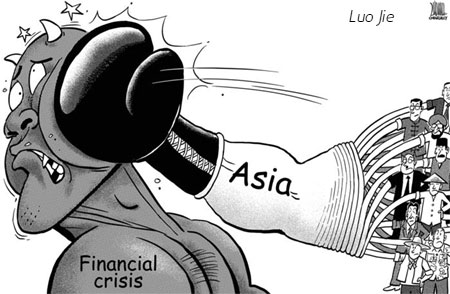


Asia is uniquely positioned to help pull the world out of its current economic slow down.
Global trade is expected to shrink 9 percent and industrial output 15 percent, which will likely make the global economy contract by 1 to 2 percent, the grimmest outlook in 60 years. Asia faces the threat of plunging exports, rising unemployment and decreasing value of its foreign exchange reserves.
But compared to the US and European countries which are bearing the full blunt of the crisis, Asian countries are better off and, for the most part, boast tremendous domestic demand capacity and ample capital, since most of them are in the process of rapid urbanization and industrialization.
Asian countries could generate huge demand by expanding economic cooperation and accelerating their industrialization drive with technology from advanced economies and capital from both within and outside Asia. If such demand can be transformed into purchasing power and import capacity, it could help put the global economy back on track.
There are several things Asian countries need to do to make this happen.
Asian countries should jointly ask the US to take inflation into account in decisions about its treasury bonds.
Piling up financial derivatives created a huge bubble, which makes the depreciation of the greenback an irreversible trend. The Federal Reserve's purchase of treasury bonds helped stoke inflation. Asian countries may see major losses in their dollar-denominated assets once the greenback and the US treasuries bubble deflates.
Countries that hold a substantial amount of US treasuries, such as Japan, India and China, should petition the US to link earnings of government bonds with inflation, which will ease creditors' concern on forex reserve losses and make sure the US economy continues to get a lift from foreign capital.
Asian countries should consider using International Monetary Fund's Special Drawing Rights (SDR) as the reserve currency of Asia on the basis of the Chiang Mai agreements.
The greenback, euro and yuan should be the three main pillars of any future international monetary system, providing more options for businesses and governments. Any of the three currencies will be dumped if it depreciates, others can be added if they appreciate. The three currencies will help to establish a stable international financial system by competing with and complementing each other.
But the yuan cannot be used as an international currency unless it becomes fully convertible and a sound capital market with an advanced exchange system is established.
China's central bank governor Zhou Xiaochuan earlier proposed using SDR instead of a sovereign currency as the international reserve currency, which got attention from the IMF and is supposed to be discussed later this year.
Asia can be a test field for such an initiative. More extensive financial cooperation among Asian countries will yield fruitful results, as it could improve immunity to financial risks, guarantee the value of their forex reserve and enhance Asia's attractiveness to the rest of the world.
Asia should also set up its own infrastructure and agriculture investment banks to speed up its development.
Asian countries need to improve their poor infrastructure. Investing capital on infrastructure projects will have a better return than buying US treasuries. Establishing an infrastructure investment bank, jointly sponsored by Asian countries, will help lure more foreign capital.
Asia boasts resources and great potential for agricultural production. Founding an agricultural investment bank will help Asian countries produce more crops.
The two banks will compete with the existing Asian Development Bank, making them all more efficient. Investment from these three lenders could spark huge demand for raw materials, which is of vital importance for pulling the world out of crisis and promoting the development of Asia.
The author is the executive-vice president of China Center for International Economic Exchanges. The article was reprinted from China Business News
(China Daily 05/04/2009 page2)













